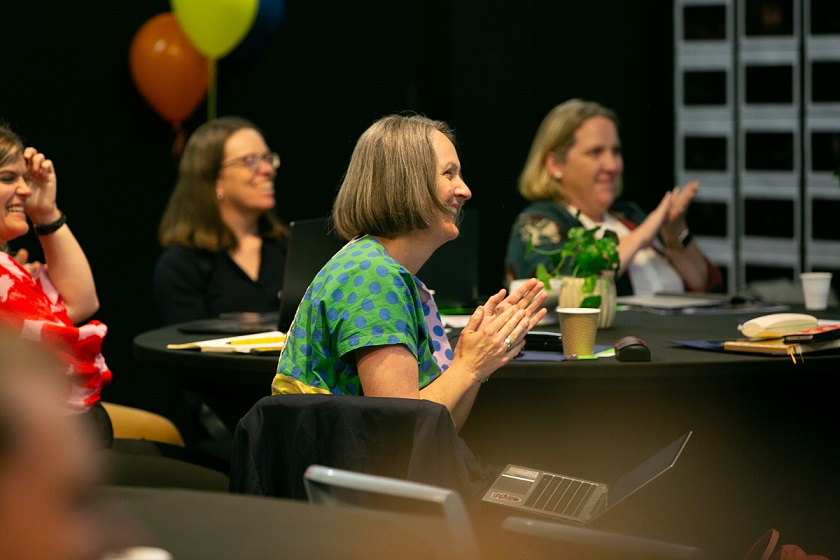
A new research institute launched by a Sunshine Coast school aims to build a culture of collaboration and innovation among teachers and leaders nationwide.
Research has shown that systems and schools that prioritise data-driven evaluation have a greater impact on student outcomes than those who don’t.
A 2022 survey of more than 900 teachers and school leaders across Australia found that while most educators are using evidence to improve student learning their classrooms, some aren’t using all the strategies necessary for those practices to be effective.
Pioneering research within schools
The new Flinders Discovery Institute (FDI), developed by Matthew Flinders Anglican College, was launched last week as part of the Research-Invested Schools National Conference, which Flinders co-hosted with St Andrew’s Anglican College on Thursday, 12 October and Friday, 13 October 2023.
Attending the launch were more than 50 guests from leading schools and universities across Australia, including school principals, teachers, school research leads, university lecturers and research fellows, as well as students, staff and parents from the Flinders community.
“Schools are, by nature, inward facing - they emphasise classroom practice and daily micro-nurturing of the young people in their care. However, we know that good schools are committed to looking outward and building on their culture of collaboration and innovation,” Flinders Principal Stuart Meade told The Educator.
Meade said the FDI has a range of benefits for principals, including igniting curiosity and inquiry, enabling a sense of discovery through research, embedding educational innovation, and providing teachers with greater exposure to professional development.
“There are also great networking opportunities for staff, who can connect with researchers, experts and other educators, fostering a community of collaboration and knowledge exchange,” Meade said.
“These partnerships can lead to joint projects, teacher exchanges and shared resources, enriching the overall educational experience.”
Timely and insightful data for schools
Flinders Head of FDI, Dr Louise McCuaig said the school has a unique opportunity to conduct longitudinal studies that provide timely and insightful data.
“We also have the opportunity to build robust programs that continue to reinforce key knowledge, skills and capacities across the entire growth span of a young person,” Dr McCuaig told The Educator, adding that the FDI website will offer research findings and milestone reports.
“School leaders are invited to use the information provided to inform their schools and create innovative learning experiences and programs that specifically address the needs and interests of their student communities.”
Dr McCuaig the FDI will also explicitly seek to create a more porous boundary between tertiary institutions and the Flinders school community.
“We recognise that universities want and need publications, research data and outreach opportunities that facilitate future pathways. We also recognise that researchers have much to gain by sharing their excitement, passion and creativity.”
“For example, the talented women researchers and postdoctoral students who engage with our annual Inspiring Women in Science and Health [I-WiSH] conferences enjoy the rare opportunity to share and celebrate their project achievements and are energised through their collaborations with young people who are passionate about science.”
Dr McCuaig said the FDI wants staff and students to feel they belong and can confidently navigate tertiary worlds.
“Schools benefit from cutting-edge expertise, valid insight into the impact of their programs and opportunities for their staff and students to access professional development,” she said.
“As a guiding principle of the FDI to support professional development, any research conducted within the school will carry with it a requirement for researchers to share their expertise with members of the college community.”
Standing on the shoulders of giants
Meade said the College, which is still in its infancy is “standing on the shoulders of giants in the field of educational research as it develops a profile and place for research using its own Discovery Institute.
“I am a passionate advocate for such an entity, and I commend the collaboration and work of the Research-Invested Schools network.”
Moving forward, says Dr McCuaig, the FDI offers an institute model that can be adopted and adapted to meet the contextual needs of other schools.
“The FDI acknowledges that schools are ‘hotbeds of innovation’ as they seek to respond appropriately to global, systemic and local needs and challenges,” she said.
“Establishing the FDI has taught our College that building a research entity within a school must first seek to identify, nurture and enhance the micro and macro-level initiatives that school leaders, heads of department and teachers have created in response to authentic challenges in their sphere of influence or area of responsibility."
Dr McCuaig said the offer is open to other schools to collaborate with Flinders, which she said is “keen to share its learnings”.
“Flinders Invites educators and schools to join us in such research collaborative events as our Inspiring Women in Science and Health (I-WiSH) conference and we are keen to share our learnings should they wish to conduct their own events of this nature.”


